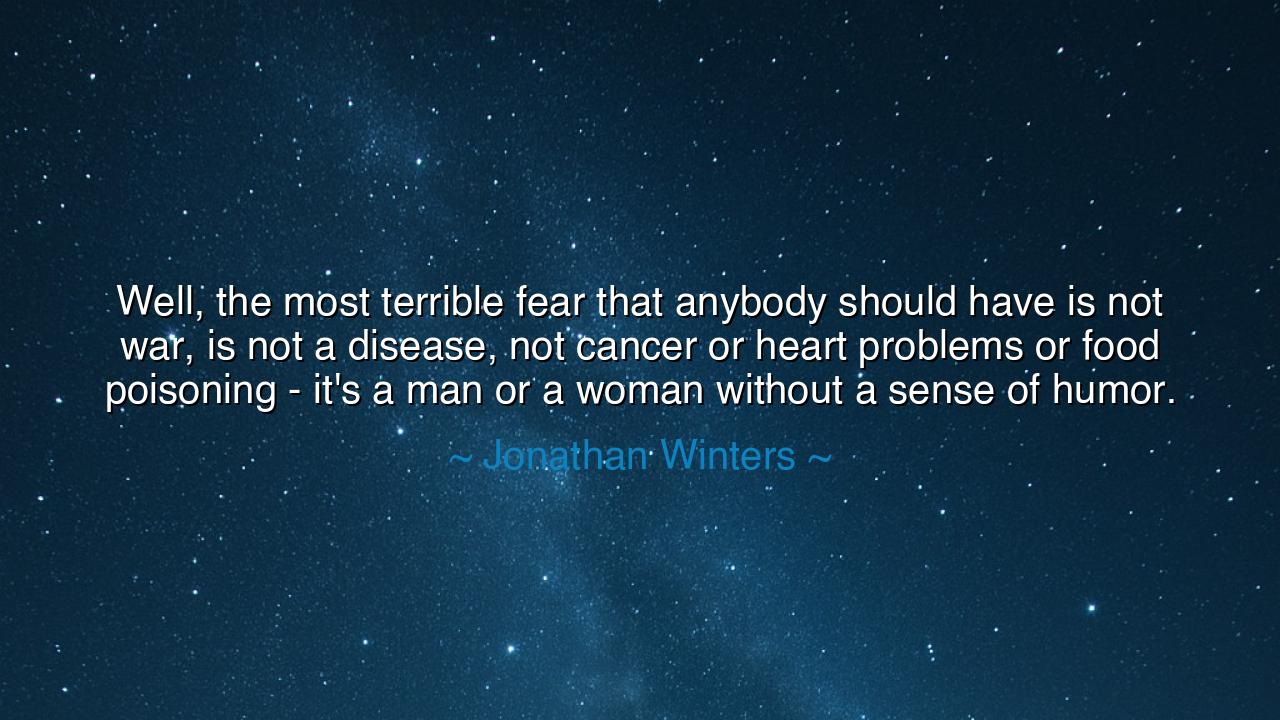
Well, the most terrible fear that anybody should have is not war
Well, the most terrible fear that anybody should have is not war, is not a disease, not cancer or heart problems or food poisoning - it's a man or a woman without a sense of humor.






When Jonathan Winters said, “Well, the most terrible fear that anybody should have is not war, is not a disease, not cancer or heart problems or food poisoning — it's a man or a woman without a sense of humor,” he spoke not merely as a comedian, but as a philosopher of the human spirit. Behind his laughter was a deep and ancient wisdom — the understanding that humor is the guardian of sanity, the light that burns even in the darkest hours. His words are not a jest, but a warning: that a world without laughter is a world stripped of mercy, and a soul without humor is one that has forgotten how to live.
To understand this truth, one must see humor as more than amusement. Humor is resilience — the divine spark that allows humankind to rise again after tragedy, to endure pain without surrendering to bitterness. Winters, who fought through years of depression and personal struggle, knew that laughter is not born of ignorance, but of wisdom. The man who can laugh in sorrow has learned the secret of endurance; he has seen the abyss and chosen to smile back at it. A person without humor, however successful, however powerful, is like a ship without sails — moving, perhaps, but lifeless and lost.
The ancients themselves understood this sacred power. Socrates, in his dialogues, often cloaked his wisdom in irony; Diogenes, the Cynic, used ridicule to expose hypocrisy. Even the Stoics, who preached self-control, spoke of laughter as the expression of an enlightened soul. For they knew that humor disarms pride and softens cruelty. Winters, in his own way, carried this same torch. He saw that the human race, with all its wars and diseases, could survive anything — except the loss of joy. When a man cannot laugh, he becomes dangerous, for he forgets compassion. When a woman cannot smile, her spirit withers, for she forgets wonder.
There is an old story from the time of Abraham Lincoln, who, in the midst of the American Civil War — when his nation was torn apart by death and despair — was criticized for laughing during a cabinet meeting. His critics called him heartless. But Lincoln replied, “I laugh because I must not cry.” That moment revealed the essence of humor’s power: it is not a denial of pain, but a rebellion against it. To laugh in dark times is to proclaim that the human spirit will not be conquered. Winters understood this, too. His humor, often strange and whimsical, was the laughter of a soul that refused to be broken by sorrow.
A sense of humor, then, is not a frivolous trait but a sign of wisdom and emotional health. The person without it sees only the surface of things — their tragedies, their flaws, their absurdities — but never their irony, their hidden beauty. Such a person grows rigid and bitter, incapable of forgiveness or delight. The one who can laugh, however, carries the fire of youth within the heart, even in old age. Laughter purifies the soul of anger and gives life its rhythm again. To live without humor is to live without air, without light, without grace.
Jonathan Winters, a man of both madness and brilliance, knew this from experience. Behind his comedy was pain, yet through that pain he found art. His laughter was not cheap; it was born of understanding that life is tragic and beautiful in the same breath. To lose humor is to lose sight of that mystery — to see only the tragedy and forget the beauty. That, he said, is the only thing truly to be feared. For war will end, and disease may heal, but a spirit that cannot laugh is a soul already entombed.
So, dear listener, take this as both a warning and a blessing: protect your sense of humor as you would protect your heart. When sorrow visits, meet it with courage — and with laughter. When anger arises, soften it with wit. Seek not to laugh at others, but to laugh with life itself. For humor is not weakness; it is the highest form of strength, the proof that the divine still flickers within us.
And remember this: when the world seems most terrible, laughter is not betrayal — it is resistance. To laugh, even gently, is to say, “I will not be destroyed.” That is the lesson Jonathan Winters left us — that laughter is the soul’s most ancient armor, and without it, all the rest of life’s defenses are nothing but dust.






AAdministratorAdministrator
Welcome, honored guests. Please leave a comment, we will respond soon